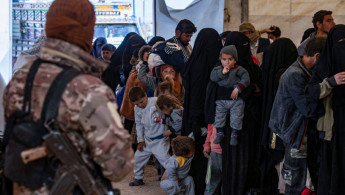Pro-Iran militias 'stopping repatriation' of Iraqis from Syria's Al-Hol camp
Pressure from Iraqi political parties and pro-Iran militias is hindering the return of thousands of Iraqi civilians from the Kurdish-administered Al-Hol camp in northeastern Syria, Iraqi officials have said.
The camp, which is notorious for its poor conditions and violence, is home to about 50,000 people including family members of suspected jihadists. Around 27,000 of them are Iraqi civilians who escaped to neighbouring Syria due to the conflict between the Islamic State group and Iraqi government forces and their allied militias.
The IS extremists in 2014 launched a brutal military campaing in Iraq and Syria in 2013 and 2014, marked by mass killings, torture, rape and slavery.
Iraqi Prime Minister Mohammed Shia al-Sudani previously vowed to return all displaced Iraqis within six months of taking office.
“Six months ago, a committee was tasked with repatriating the Iraqis from Al-Hol camp to their hometowns after their rehabilitation in society, but so far the committee has done nothing, due to political circumstances,” Sagvan Sindi, the Deputy Head of the Security and Defence Committee in the Iraqi parliament told The New Arab in a telephone interview.
“Some political parties and Iraqi militias are hindering the repatriation process.”
مجموعة من الإيزيديين تعتدي على جامع الرحمن في قضاء #سنجار بعد عودة 20 عائلة إلى مركز المدينة pic.twitter.com/oN8SHi5YrT
— ِِAmmar Alhadithy | عمار الحديثي (@Ammar_alhadithy) April 27, 2023
A well-informed source from Mosul, speaking on condition of anonymity, said to TNA, “Not just the Shia militias, but all the other communities in Nineveh are against the return of those Iraqis, as they consider them as wives and children of the IS."
Some Iraqi families have returned and are being held at Al-Jadaa camp, located in southern Mosul province, where they are undergoing a rehabilitation program under the supervision of the United Nations.
Security sources told The New Arab's sister site Al-Araby Al-Jadeed that due to strict security checks, only 603 families returned to their homes throughout 2022.
On Thursday a protest was held in Sinjar, 120 kilometres west of Mosul, against the recent return of several Sunni Arab families to the town, which is also home to members of the Yazidi religious community.
The demonstration led to the spread of unfounded rumours on social media, with people claiming that the Yazidis had burnt the Rahman Mosque in the town. Yazidi and Muslim community leaders denied the rumours.
Islamic State (IS) militants took over Sinjar in August 2014 after the Iraqi army and Kurdish peshmerga forces retreated from the area, launching a genocidal campaign against Yazidis and subjecting them to killings, rape, and enslavement.
Since its liberation from IS in 2015, the town has been administered by Iran-backed Popular Mobilization Forces, including the Sinjar Resistance Units (YBS) which is a Yazidi militia seen as close to the Kurdistan Workers Party (PKK).
Media outlets close to YBS claimed that the reason behind the demonstration was that a Yazidi girl has recognized one of the IS militants - who assaulted her in the past - within those families recently returned to Sinjar.
“The Iraqi government has vowed to implement the Sinjar pact, but so far it did not because of political pressures from Iran,” Sindi added.
In October 2020, the federal government of Iraq and the KRG signed a deal to normalise the situation in Sinjar and appoint a new administration for the town.
According to the deal, all forces associated with the PKK must withdraw from the city, with local and federal police in charge of maintaining security with the help of Iraqi national security forces.
The agreement, however, has not been carried out. Yazidis have rejected the deal, saying that the Iraqi central government in Baghdad and the Kurdistan Regional Government in Erbil “do not respect the will of the people" in the area.




 Follow the Middle East's top stories in English at The New Arab on Google News
Follow the Middle East's top stories in English at The New Arab on Google News


![A group of Palestinians, foreign and Israeli activists gather to participated in an olive picking event on the land in the town of Battir, which is under threat of confiscation by Israel in Bethlehem, occupied West Bank on 8 November 2024. [Getty]](/sites/default/files/styles/image_330x185/public/2182930803.jpeg?h=199d8c1f&itok=__0LgGsa)